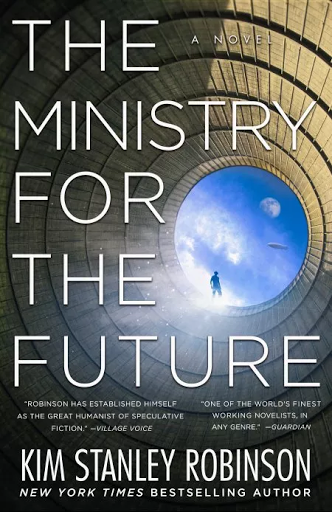Review: Kim Stanley Robinson’s “The Ministry for the Future”
by Miles Raymer

When Ezra Klein says something like, “this is the most important book I read this year,” there’s little question as to what I’ll do next. That’s how Kim Stanley Robinson’s The Ministry for the Future made its way into my life, and boy am I glad it did! This remarkable, brilliant, and wildly useful book is one of the worst novels I’ve ever read. Let me explain.
The Ministry for the Future is a work of near-future “cli-fi” that envisions how the next few decades of human history might play out. Essentially, it’s a cornucopia of smart ideas with which we can frame the problem and begin enacting workable solutions to our planet’s ongoing environmental crisis. The breadth of content is impressive, including but hardly limited to: the financial, economic, political, and technological tools we’ll need to reduce and eventually eliminate carbon emissions; the unique character of trauma caused by anthropogenic natural disasters; the tension between knowledge and action; the processes of change and progress in individuals, societies, and ecosystems; playful personifications of physical phenomena; what it’s like to live through a pivotal moment in history; the logistics of rewilding half the planet; emergence of a new global identity in the form of a Gaia-based religion; the consequences of ubiquitous, drone-driven eco-terrorism; the endless ethical quandaries and compromises that climate change entails; and the semi-utopia that may await us if we manage to avoid the worst case scenarios.
If some or most of that sounds intriguing to you, this book won’t disappoint. Robinson’s not the most elegant writer, but he certainly has a way with words, and his love for humanity and nature are palpable and infectious. He’s also just cheeky enough to inject much-needed levity into these grim and intimidating topics.
I’ve got a few minor gripes I’d like to get off my chest before laying out what I think is the Ministry‘s biggest flaw. As is the case with many committed leftists, Robinson can come off as a bit too sanguine about the negative consequences of natural disasters and the “revolutionary” tactics used to create change throughout the novel. There’s a lot of death and destruction in this book, and Robinson uses the fictional veil to avoid directly endorsing ethically-ambiguous behavior aimed at “saving the world.” But I think this backfires, giving the impression that Robinson has some fairly bloodthirsty tendencies that he’s not willing to own up to. I’ll admit that this is purely speculative; I of course have no idea what’s really going on in Robinson’s head. Other complaints include: not taking nuclear power seriously as a critical component of carbon reduction, occasionally championing hand-wavy socialist solutions as fixes for caricatured capitalist failings, and obnoxiously-long sections showing off Robinson’s personal knowledge of Zurich, the Alps, and Antarctica.
The major problem with this novel, however, is that it almost completely fails as a “traditional” novel. There’s very little in the way of character development and meaningful relationships, which means that readers who depend on these features to carry them through a book will likely be unwilling to follow Robinson down his many delightful rabbit holes. Robinson makes a few feeble attempts at crafting characters we should care about, but for me these all fell flat. Ironically, I was more intrigued by the many nameless characters who pop in and out of the story to share a little slice of their perspective within the churn of global events. I wish Robinson had fully embraced this style, tossing aside all pretensions to traditional narrative format and spitting out something wholly faceless and cosmopolitan. I’m honestly not sure if this would have produced a “better” book, but I certainly think it would have produced a bolder and more coherent one.
I’ve been a bit hard on Robinson here, and honestly I’m not sure if my criticisms will continue to feel valid as I gain some distance from the book. So I’m giving it my full endorsement––warts and all. The Ministry for the Future isn’t just an important book, but also a deeply hopeful one that eschews fashionable cynicism in favor of gritty, realistic answers to our most obstinate problems. It isn’t quite the book I wanted, but it might just be the book we need.
Rating: 8/10